ALEXANDRIA, Va. – Canadian authorities have filed felony charges against two Jamaican nationals suspected in a scam using phony credit unions in the United States to bilk consumers out of millions. Both men, Leslie Card, 35, and Kevin Card, 33, were arrested June 10 and booked on 22 felony charges in Ontario, including defrauding the public for creating the fraudulent "America's Choice" and "Heartland" credit unions, though these are names of legitimate credit unions as well. According to Canadian authorities, the scam brought in an average of $10,000 a day. But NCUA Federal Investigator David Eno told Credit Union Times the Canadians felt that was a modest estimate. In one shot they ripped off a church janitor for $15,500. One particularly heart wrenching story Eno related was a couple who lost their jobs in the telecom bust and were trying to save their home but instead were out several thousand dollars. They not only lost there house, but also discovered the woman was pregnant. "According to Canadian authorities, they say they've been in business for 10 years," Eno said. The first wave hit several banks in Canada. The large U.S. banks were hit until finally it landed on credit unions in the last 10 months. Other fraudulent credit unions used were Zurich, Century, and First Continental, Eno explained. NCUA has been working with Canadian authorities over the last 10 months after people in 23 states reported they were duped by false ads claiming to be legitimate credit unions. The arrest stemmed from an international partnership including the Toronto Police Service Fraud Squad, the Ministry of Consumer and Business Services, OPP Anti-Rackets, the Competition Bureau, the York Regional Police Service Fraud Squad, the Royal Canadian Mounted Police, the Peel Regional Police Service Fraud Squad, the U.S. Federal Trade Commission, and the U.S. Postal Inspection Service, with assistance from the Durham Regional Police Service Fraud Squad and Tactical Unit. "We have compiled hundreds of documents which prove that perpetrators in Canada advertised in newspapers in 23 states using stolen information from credit cards for billing and purporting to be federal credit unions utilizing pre-paid, toll-free 866 telephone lines," NCUA General Counsel Robert M. Fenner said. He explained, "They advertised low-interest loans for people with bad credit and then demanded people send cash `origination fees' and five-month cash advanced payments to Western Union in the Toronto area were the money was picked up under assumed names. Victims were only left with forged documents purported to be federal disclosure papers on the loans." When Canadian authorities executed the search warrant, Eno said, the `business' was in full operation and law enforcement found a lot of evidence of the fraudulent credit union scam as well as drugs and guns. NCUA had been warning credit unions across the country that the scam was going on. The agency subpoenaed documents and statements from victims. NCUA also notified the American Newspaper Association, who in turn sent out 7,000 letters to publishers and advertising heads to warn against publishing the advertisements. NCUA's investigative team included Eno and Jerry Poliquin and Jon Canerday of the Office of General Counsel.
Complete your profile to continue reading and get FREE access to CUTimes.com, part of your ALM digital membership.
Your access to unlimited CUTimes.com content isn’t changing.
Once you are an ALM digital member, you’ll receive:
- Breaking credit union news and analysis, on-site and via our newsletters and custom alerts
- Weekly Shared Accounts podcast featuring exclusive interviews with industry leaders
- Educational webcasts, white papers, and ebooks from industry thought leaders
- Critical coverage of the commercial real estate and financial advisory markets on our other ALM sites, GlobeSt.com and ThinkAdvisor.com
Already have an account? Sign In Now
© 2025 ALM Global, LLC, All Rights Reserved. Request academic re-use from www.copyright.com. All other uses, submit a request to [email protected]. For more information visit Asset & Logo Licensing.









